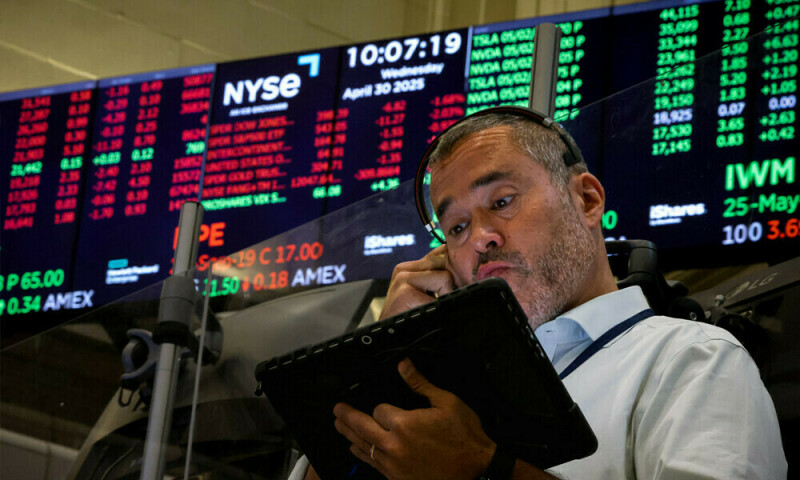Wall Street’s main indexes fell on Monday after U.S. President Donald Trump rekindled worries about the fallout of a global trade war by introducing new tariffs, while focus remained on the Federal Reserve’s monetary policy decision later this week.
On Sunday, Trump announced a 100% tariff on movies produced outside the U.S. but offered little clarity on how the levies would be implemented.
Movie and television production companies that film overseas fell. Netflix was down 2.2% and Amazon.com fell 1.9%, while Warner Bros. Discovery and Paramount fell 1.3% and 1.4%, respectively.
Separately, class B shares of Warren Buffett’s Berkshire Hathaway were down 6.2% after the investor said he will step down as CEO of the conglomerate, with the stock weighing on the S&P 500 financials sector.
At 10:03 a.m. ET, the Dow Jones Industrial Average fell 73.36 points, or 0.17%, to 41,245.64, the S&P 500 lost 30.24 points, or 0.54%, to 5,656.43, and the Nasdaq Composite lost 94.25 points, or 0.52%, to 17,883.48.
Nine of the S&P 500’s 11 sectors fell, with energy stocks down 1.9% as crude prices dropped on anticipation of increased supply by OPEC+ countries.
In a bright spot, an ISM survey showed services sector activity picked up in April, standing at 51.6, more than the 50.2 that economists polled by Reuters were expecting.
US media stocks fall as Trump threatens 100% tariff on foreign-made films
On Friday, the S&P 500 notched its ninth session of gains, a streak last seen in 2004, on hopes of potential easing of Sino-U.S. trade tensions.
This week, the spotlight will be on the U.S. Fed, which is widely expected to keep interest rates on hold. Commentary from central bank policymakers will be in focus to gauge their approach to monetary policy easing this year amid tariff impacts.
“What we’re still dealing with is policy versus economics … we haven’t yet been able to see what the final impact from the tariff situation will be,” said Phil Blancato, CEO of Ladenburg Thalmann Asset Management.
Data last week showed the world’s biggest economy contracted in the first quarter, for the first time since 2022, as traders rushed to import goods before tariffs kicked in, raising worries about slowing growth.
Traders are pricing in 25 basis points of easing by the Fed only by July, and see a total of 80 points of cuts by the end of the year, according to data compiled by LSEG.
Investor attention will also be on how companies are navigating tariff-induced uncertainty.
Tyson Foods dropped 8.1% after the meat packer missed quarterly revenue expectations.
U.S.-listed shares of gold miners Gold Fields Ltd and Anglogold Ashanti gained 7.4% and 4.3%, respectively, tracking higher gold prices.
Skechers jumped 24% after the footwear maker agreed to be taken private by 3G Capital in a $9.4 billion deal.
Declining issues outnumbered advancers for a 1.96-to-1 ratio on the NYSE and a 1.65-to-1 ratio on the Nasdaq.
The S&P 500 posted three new 52-week highs and three new lows, while the Nasdaq Composite recorded 25 new highs and 27 new lows.


